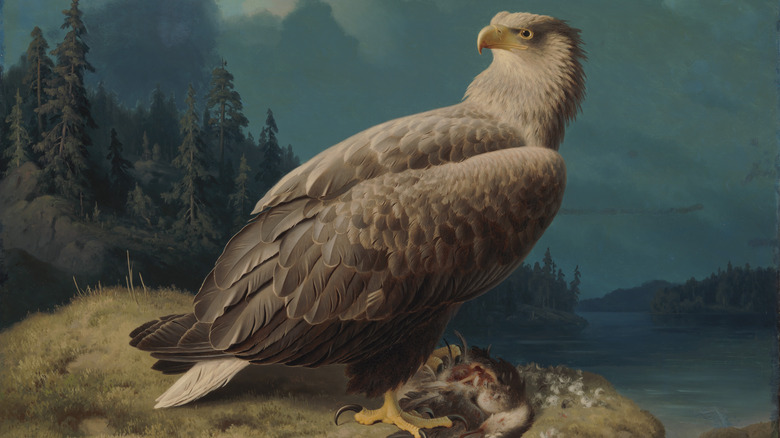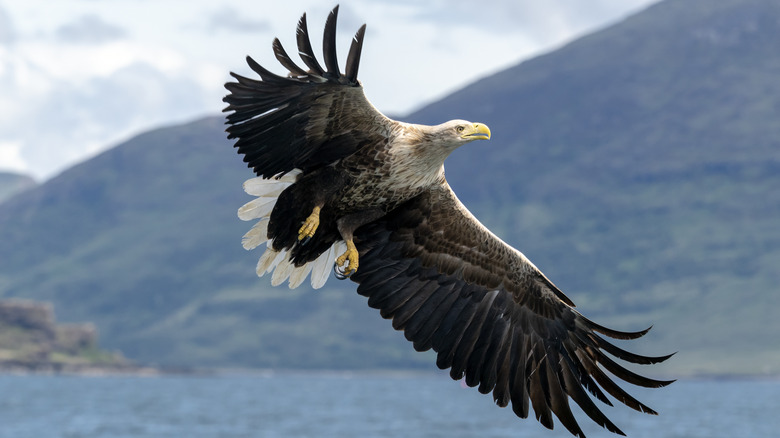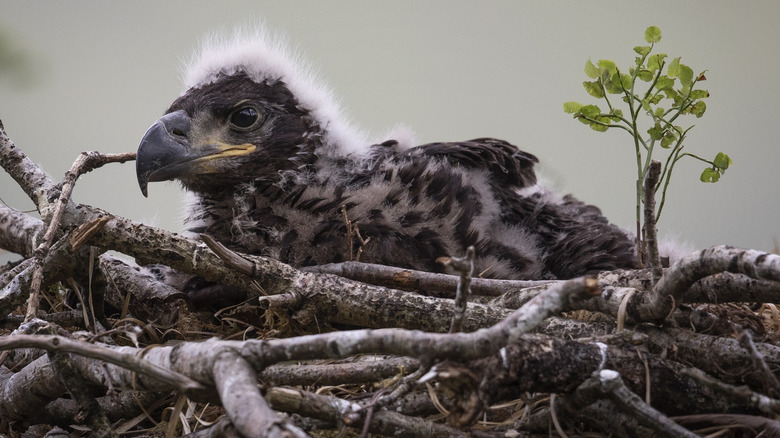After Hundreds Of Years, This Rare Bird Species Is Back, And Scientists Are Thrilled
The beautiful white-tailed eagle is native to the British Isles, found in Scotland, England, and the Isle of Mull. Often called a sea eagle for its tendency to prey on fish as well as small mammals, this bird of prey can live up to 25 years and has a 7-foot wingspan. What's more, these majestic birds mate for life and return to the same territory to breed year after year.
Unfortunately, humanity has not been kind to the white-tailed eagle. In the 18th century, these eagles were hunted to extinction in England. Then, despite legal protections eventually being put into place, in the 1970s, the eagles had another uphill battle in the form of toxic chemicals. Exposure to dangerous contaminants around the Baltic Sea made wild breeding efforts unsuccessful. Scientists even uncovered dead eggs with contaminants in them, and female eagles stopped being able to reproduce after exposure.
There were worries that the white-tailed eagles would become another species permanently declared extinct. However, despite this rough history, a reintroduction program has had some success in bringing the white-tailed eagles back to the wild. Normally, that would be a cause for celebration, but there are still human-related challenges causing eagle deaths that could put an end to all the success the program has had.
How this rare bird species was brought back
Scientific efforts to protect wildlife are key; that's true for many species, even including sea stars, which were dying for over a decade. For the white-tailed eagles, a new reintroduction program began in 2019, spearheaded by the Roy Dennis Wildlife Foundation and Forestry England, and scientists hoped that this time, it would be successful in bringing these birds back. As it turned out, those hopes were well founded. Over the ensuing years, this program has successfully bred white-tailed eagle chicks and released them into the wild. They are now tracked via satellite to monitor how well they are doing.
The program has released 45 eagles into the wild, with eight being released in 2025 alone. These releases have been a success, with the eagles creating two wild nests in 2025. That is a massive milestone for this program. One pair of eagles has given birth to the first chick born in the wild in 240 years. Since then, five more baby chicks have been born.
Steve Egerton-Read, a project officer for Forestry England, said in a statement to BBC, "We have been patiently monitoring these nests for many months and hoping they would be successful ... It is always such an exciting time but also incredibly nerve wracking."
The uncertain future for the eagle
Although it's not always the case, attempts to save species can be met with success, like the discovery of a fish species once thought to be extinct. In that same vein, the year 2025 has been a good one for the white-tailed eagle reintroduction program. It gives scientists and conservationists hope that the eagles can soar over England once again.
However, there are still major human-related challenges facing these eagles. In 2019, British police investigated eagles found dead in country estates in Dorset and Sussex. The cause of death was ruled to be rat poisoning, but questions were raised whether this was an accident or a deliberate poisoning. If on purpose, it would not be the only time that gamekeepers poisoned birds of prey. Some of these large estates breed birds for hunting parties, but when large birds like the white-tailed eagles are flying overhead, it can scare off the game birds that humans have paid to hunt for sport.
Not everyone sees this as a particularly important problem, though. Regarding the investigation into the eagle deaths in Dorset, Chris Loder, a Member of Parliament for West Dorset from 2019 to 2024, said in a now-deleted X post (via DorsetLive), "Dorset is not the place for eagles to be reintroduced ... I don't condone this at all, but I want @dorsetpolice to focus on #countylines rather than spend time and resources on this." That said, it is worth noting Loder's campaign received funding from estates that run hunting parties, so his recommendations might be best taken with a grain of salt.


